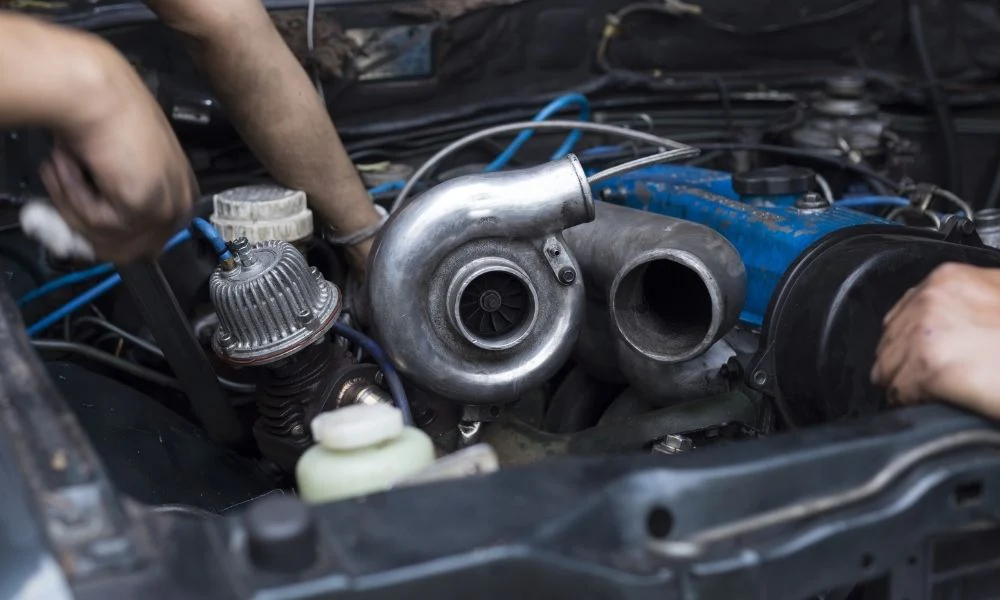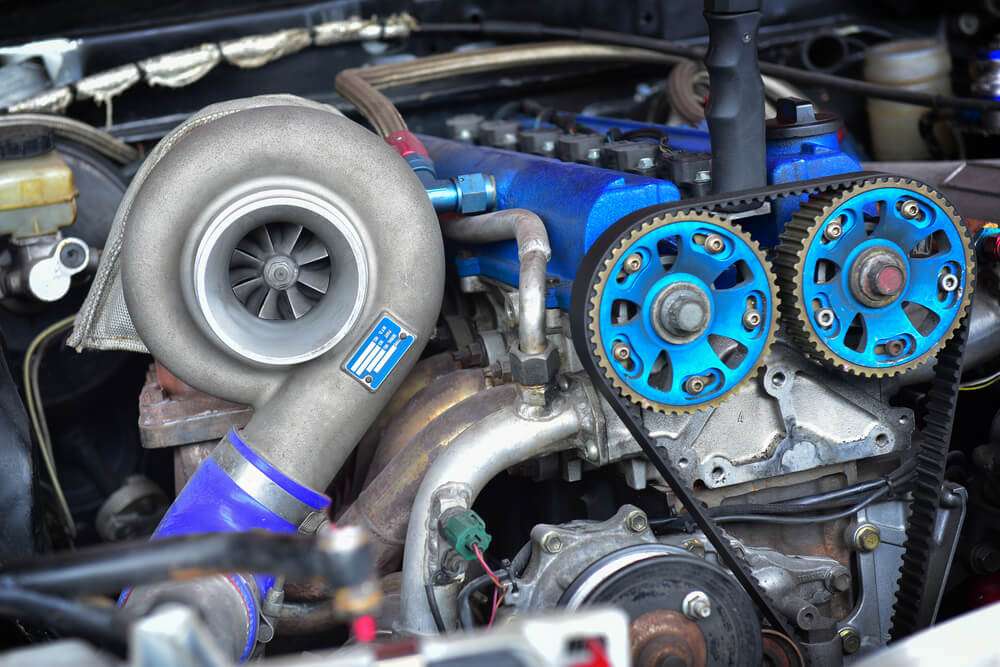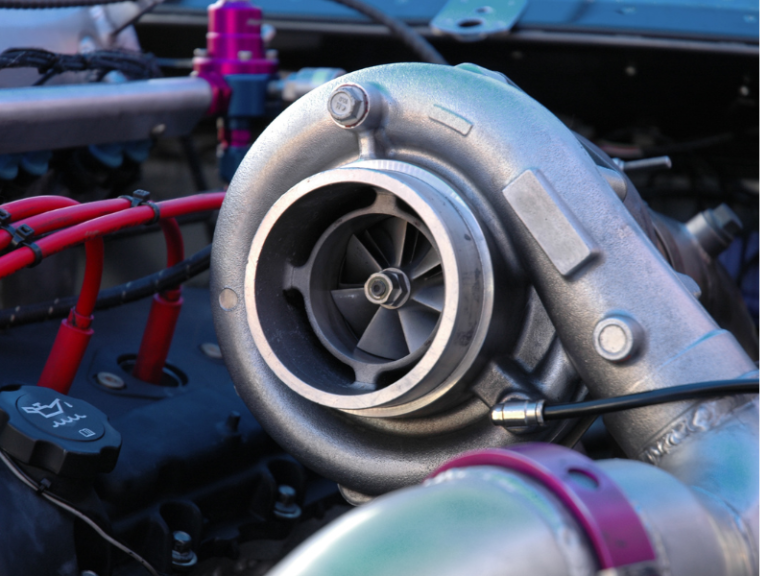Yes, replacing a turbocharger can be worthwhile if it significantly improves your vehicle’s performance and efficiency and if the cost justifies the benefits.
Here are the factors affecting the decision to replace the turbocharger:
- The extent of damage to the existing turbocharger, such as wear or failure, is a primary factor.
- Vehicle age and overall condition, including mileage and maintenance history, are essential considerations.
- The cost of replacement parts and labor plays a significant role in the decision.
- Expected performance and efficiency gains with a new turbocharger impact the choice.
- Long-term benefits, including extended vehicle life, influence the decision-making process.
- Environmental considerations, such as emissions reduction and improved fuel efficiency, may also be factors.
Signs Your Turbocharger Needs Replacement

A. Discuss common symptoms indicating a failing turbocharger.
Recognizing the signs of a failing turbocharger is essential for maintaining your vehicle’s performance and preventing more significant engine issues. Common symptoms that may indicate a failing turbocharger include:
Decreased Power and Acceleration: One of the most noticeable signs is a sudden loss of power and reduced acceleration. Your vehicle may feel sluggish, struggle to reach higher speeds, or take longer to respond when you step on the gas.
Unusual Engine Noises: A failing turbocharger can produce unusual noises, such as whining, whistling, or a high-pitched squealing sound. These noises often stem from damaged bearings or worn-out compressor wheels within the turbocharger.
Excessive Exhaust Smoke: If you notice an increase in exhaust smoke, particularly black or blue smoke, it can indicate that the turbocharger is failing. Oil leaking into the exhaust system can result from a damaged turbocharger seal.
Poor Fuel Efficiency: A turbocharger helps improve fuel efficiency by increasing engine efficiency. When it fails, you may experience decreased miles per gallon (MPG) as the engine struggles to burn fuel effectively.
If your check engine light or turbocharger-specific warning light illuminates on the dashboard, it’s a clear indicator that you should have your turbocharger inspected.
B. Why Should You Recognize These Signs Early?
Identifying the signs of a failing turbocharger early on is crucial for several reasons:
Prevents Further Damage: A failing turbocharger can lead to more extensive engine damage if not addressed promptly. Delaying repairs can result in costly engine repairs or even engine failure.
Improved Safety: A sudden loss of power or unexpected engine issues can compromise your safety while driving. Addressing turbocharger problems ensures that your vehicle remains reliable and safe on the road.
Cost-Effective Repairs: Turbocharger replacement can be expensive, but catching the issue early often allows for less expensive repairs.
Waiting until the turbocharger fails completely may require a complete replacement and additional repairs, driving up the costs significantly.
Maintains Performance: Turbochargers play a vital role in enhancing engine performance. Recognizing and addressing turbocharger problems ensures that your vehicle continues to deliver the power and efficiency you expect.
Factors Influencing the Decision of Replacing the Turbo
A. Various factors that impact the decision to replace a turbocharger.
The decision to replace a turbocharger is influenced by several factors that should be carefully considered:
- Turbocharger Condition: The primary factor is the current condition of the turbocharger. You must replace it immediately if it shows signs of significant wear and tear.
- Vehicle Performance: Assess your vehicle’s performance before and after turbocharger issues. If you notice a substantial decrease in power and acceleration, it may be a strong motivator for replacement.
- Cost of Repair: Evaluate the cost of repairing the existing turbocharger versus the replacement cost. Sometimes, repair may be a more cost-effective option if the damage is minimal.
- Vehicle Value: Consider the value of your vehicle. Replacing a turbocharger in a high-value vehicle may make more financial sense than doing so in a lower-value vehicle.
- Driving Habits: Your driving habits and needs play a role. A functioning turbocharger may be essential if you regularly tow heavy loads, drive long distances, or demand high performance from your vehicle.
- Emissions Regulations: Turbochargers can impact emissions. If your vehicle needs to meet strict emissions standards, a failing turbocharger may lead to increased emissions and compliance issues.
- Long-Term Goals: Determine your long-term plans for the vehicle. Investing in a new turbocharger may be worthwhile if you intend to keep it for several more years.
On the other hand, if you plan to sell or upgrade soon, a less expensive repair might suffice.
B. How the type of vehicle and its age can be significant considerations.
Type of Vehicle: The type of vehicle you own is a crucial consideration. Turbochargers are more common in performance-oriented cars and diesel trucks.
In these vehicles, a functioning turbocharger significantly contributes to power and efficiency. Conversely, replacement may not be as critical in economy cars or older vehicles without turbochargers.
Vehicle Age: The age of your vehicle is a significant factor. In older vehicles, the replacement cost might not be justified unless it’s a classic or a cherished collectible.
Newer vehicles with turbochargers are more likely to benefit from replacement, as it can extend the life and performance of the vehicle.
Manufacturer’s Recommendations: Consult your vehicle’s manufacturer guidelines and maintenance schedule.
Some manufacturers may recommend turbocharger replacement or maintenance at certain mileage intervals.
Cost Comparison Associated with the Turbocharger Replacement
A. The costs associated with turbocharger replacement, including parts and labor.
Replacing a turbocharger involves several costs, including parts and labor.
The actual expenses can vary significantly depending on factors like the type of vehicle, labor rates in your area, and whether you choose to use new or refurbished parts. Here’s a breakdown of typical costs:
Turbocharger Unit: The cost of a new turbocharger unit can range from $500 to $2,500 or more, depending on the make and model of your vehicle. Refurbished or remanufactured units may be cheaper, starting at around $300.
Labor Costs: The labor costs for turbocharger replacement can differ based on the job’s complexity, ranging from $500 to $1,500 or more. Due to their intricate engine designs, high-end or luxury vehicles may have higher labor costs.
Additional Parts: You may need to purchase additional parts such as gaskets, seals, and oil lines. These can add anywhere from $50 to $200 to the total cost.
Diagnostic Costs: Before replacement, there may be diagnostic costs to determine if the turbocharger is indeed the issue. These can range from $100 to $200.
B. Compare the cost of replacement to the potential benefits.
Now, let’s compare the cost of turbocharger replacement to the potential benefits with numerical information:
Improved Performance: A new or properly functioning turbocharger can significantly boost your vehicle’s performance.
You may experience a noticeable increase in power and acceleration. For example, a turbocharger replacement costing $2,000 could provide a 20% improvement in horsepower and torque.
Enhanced Fuel Efficiency: A properly functioning turbocharger can enhance fuel efficiency by enabling the engine to burn fuel more efficiently.
This can lead to a 10% to 15% improvement in miles per gallon (MPG). If you currently get 20 MPG, a 15% improvement could mean 23 MPG.
Long-Term Savings: While the initial cost of replacement can be substantial, the long-term savings from improved fuel efficiency and performance can offset this expense over time.
Let’s say you drive 15,000 miles per year, and gas costs $3.00 per gallon. A 15% increase in MPG could save you around $300 annually.
Extended Vehicle Life: A new turbocharger can extend the life of your vehicle, potentially delaying the need for a new car purchase and
Performance and Efficiency of Vehicle’s Performance
A. How a new turbocharger can enhance your vehicle’s performance and fuel efficiency.
A new turbocharger can substantially impact your vehicle’s performance and fuel efficiency. Here’s how:
Increased Power: A turbocharger compresses air and forces it into the engine’s combustion chamber, allowing it to burn more fuel and generate more power.
This results in a significant boost in horsepower and torque. The improved power output can make your vehicle feel more responsive, especially during acceleration and overtaking.
Enhanced Torque: Turbochargers are known for providing high torque at lower RPMs. This means you’ll experience better low-end torque, which is particularly useful for tasks like towing or driving uphill.
Improved Acceleration: A turbocharger’s additional power and torque can make your vehicle accelerate faster. This can be particularly advantageous when merging onto highways or safely overtaking slower-moving vehicles.
Fuel Efficiency: While turbochargers increase power, they can also improve fuel efficiency when used efficiently.
B. Discuss the long-term advantages in terms of power and economy.
The long-term advantages of a new turbocharger extend beyond initial performance gains:
Sustained Performance: A well-maintained and properly functioning turbocharger can provide consistent power and performance over the years.
This means your vehicle will continue to deliver the same level of performance you enjoyed when the turbocharger was first replaced.
Fuel Savings: Improved fuel efficiency translates into long-term savings on fuel costs. As fuel prices tend to rise over time, the fuel economy gains from a turbocharger replacement become increasingly valuable.
Extended Engine Life: A turbocharger can efficiently boost engine power, potentially reducing engine stress and wear. This may extend the engine’s lifespan, with some estimates suggesting an increase of up to 25% in overall longevity.
Resale Value: A vehicle with a well-maintained and upgraded turbocharger may have a higher resale value. Buyers often look for vehicles with improved performance and fuel efficiency, making your vehicle more attractive in the used car market.
Environmental Benefits: Better fuel efficiency and reduced emissions are cost-effective and environmentally responsible. A turbocharger replacement can contribute to a greener, more sustainable vehicle operation.
Extending Your Vehicle’s Life
A. How a new turbocharger can contribute to the overall longevity of your vehicle.
A new turbocharger can play a pivotal role in extending the life of your vehicle in several ways:
Reduced Engine Strain: A properly functioning turbocharger enhances your engine’s efficiency by allowing it to produce more power without the need for a larger, more powerful engine.
This means the engine doesn’t have to work as hard to achieve the desired performance levels. Reduced strain on the engine components can help prevent premature wear and tear.
Lower Engine Heat: Turbochargers can help manage engine heat. By increasing power output without increasing engine size, turbochargers allow for better heat dissipation and cooling.
Cooler engine temperatures can extend the life of various engine components, including the cylinder head, valves, and exhaust system.
Enhanced Fuel Efficiency: Turbochargers improve fuel efficiency by increasing the engine’s combustion efficiency.
When the engine burns fuel more effectively, it generates fewer harmful byproducts and experiences less wear, resulting in a longer lifespan for critical engine parts.
Decreased Engine Wear: Turbochargers can contribute to reduced engine wear due to their improved lubrication and combustion efficiency. This can result in less wear on vital components like pistons, rings, and bearings.
Prevention of Carbon Buildup: Turbochargers can help prevent carbon buildup in the engine, particularly in the exhaust system.
Carbon buildup can lead to reduced engine efficiency and damage over time. A well-functioning turbocharger can mitigate this issue.
B. Highlight the potential savings on future repairs.
Investing in a new turbocharger can lead to significant savings on future repairs and maintenance:
Prevents Engine Damage: If your turbocharger is failing, it can harm other engine parts like the intercooler, exhaust manifold, and cylinder head. Replacing it before it completely fails can save you from expensive repairs.
Avoids Engine Overhauls: Turbocharger failure can result in severe engine damage, potentially necessitating a complete engine overhaul or replacement.
The cost of such repairs can be several times higher than the cost of a turbocharger replacement.
Minimizes Emergency Repairs: Turbocharger failures often lead to sudden loss of power and can leave you stranded or needing immediate repairs. Replacing the turbocharger reduces the risk of expensive emergency repairs.
Long-Term Cost-Effective Solution: While a new turbocharger represents an initial investment, it’s a cost-effective solution in the long run.
Making an Informed Decision to replace the turbo

A. The key considerations in deciding whether to replace a turbocharger.
When deciding whether to replace a turbocharger, consider the following key considerations:
Turbocharger Condition: Assess the current condition of your turbocharger. Look for signs of wear, damage, or performance issues.
Vehicle Performance: Evaluate your vehicle’s performance. Note any decrease in power, acceleration, or fuel efficiency.
Cost of Replacement: Determine the turbocharger replacement cost, including parts, labor, and additional components.
Vehicle Type and Age: Consider the type of vehicle you own and its age, as these factors can influence the necessity and cost-effectiveness of replacement.
Environmental Impact: Consider the environmental benefits of a properly functioning turbocharger, such as reduced emissions and improved fuel efficiency.
Maintenance History: Review your vehicle’s maintenance history to ensure that it has been properly cared for and that any underlying issues have been addressed.
FAQs
Is it worth replacing a turbocharger?
Yes, it is worth replacing a turbocharger if it significantly improves your vehicle’s performance and is more cost-effective than buying a new car.
What are the signs that a turbocharger needs replacement?
Signs include reduced power, excessive smoke from the exhaust, unusual noises, and warning lights. A mechanic’s assessment is crucial.
Is a turbocharger replacement the only solution for turbo issues?
Sometimes, minor repairs or cleaning can resolve turbocharger issues, so consult a mechanic for an accurate diagnosis.
Does the type of vehicle impact the decision to replace a turbocharger?
Yes, the cost and feasibility of replacing a turbocharger may vary depending on the vehicle’s make and model.
Are there different types of turbochargers, and does it affect the decision?
Yes, there are various types of turbochargers, and the choice may impact performance and cost. Consult a mechanic for guidance.
Is it more cost-effective to repair or replace a turbocharger?
The choice depends on the damage level and the replacement parts cost. In some cases, repairing can be up to 50% more cost-effective than replacement.
Should I consider a remanufactured or used turbocharger as a replacement?
It’s an option, but it depends on the quality and condition of the remanufactured or used turbocharger. New ones are often preferred.
Can a faulty turbocharger damage other engine components?
Yes, a malfunctioning turbocharger can cause damage to other engine parts, so prompt replacement or repair is advisable.
Will a new turbocharger significantly improve fuel efficiency and performance?
A properly functioning new turbocharger can improve fuel efficiency and enhance performance, especially in turbocharged engines.
What is the typical lifespan of a turbocharger?
The lifespan varies, but a turbocharger can last 100,000 miles or more with proper maintenance.
Conclusion
Turbo charger replacement is critical for vehicle owners seeking to enhance their engine performance and efficiency.
A turbocharger is a device that forces more air into an engine’s combustion chamber, allowing it to burn more fuel and produce additional power.
Over time, turbochargers can wear out or develop issues, necessitating replacement.
Before embarking on a turbocharger replacement, evaluating whether it’s a worthwhile investment for your specific vehicle is crucial.
Turbochargers are not a one-size-fits-all solution, and their advantages may vary depending on the make and model of your car or truck.

